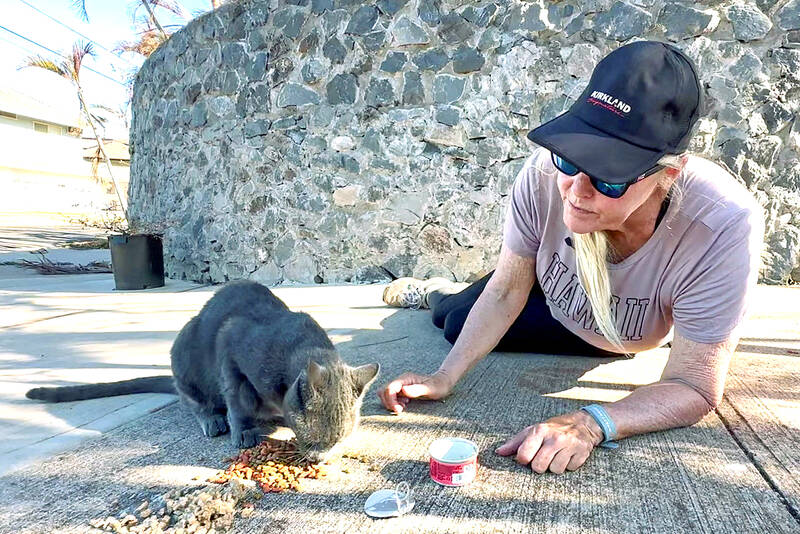Cats, owners will attest, are natural born killers and for most of their evolutionary history have enjoyed an almost entirely meat-based diet. However, new research has suggested that a vegan diet is not only safe for pet cats, but may have health benefits.
The study found that owners of cats fed vegan diets reported fewer visits to the vet, less medication use and said that their vet would be more likely to describe their cat as healthy. The findings provide reassurance to a growing number of owners who are considering alternative diets for their pets, the researchers said.
“Biologically, what cats need is not meat, but a specific set of nutrients, said Prof Andrew Knight, of the University of Winchester, who led the research. “There’s no scientific reason why you can’t supply all the necessary nutrients through plant additives.”

Photo: Reuters
Pet food production has a significant environmental impact and a growing number of cat and dog owners are interested in alternative diets.
Cats need a high-protein diet that includes certain nutrients, like taurine, which are only found naturally in meat. However, these nutrients can be synthetically manufactured or sourced from specific plants and added into vegan food as supplements. In some cases, meat-based food also has to be supplemented because the nutrients can be destroyed during processing.“The same supplements are used for vegan food to make sure it’s nutritionally sound,” Knight said.
The study, published in the journal Plos One, surveyed 1,369 cat owners, about 9 percent of whom reported feeding their cat a vegan diet. When asked about 22 specific health disorders, 42 percent of owners whose catate a meat-based diet reported at least one disorder, compared with 37 percent of owners of cats on vegan diets. Overall the vegan cats scored better on all health indicators, although these differences were not statistically significant.
The researchers could not rule out the cats obtaining meat through other means, but said that this was unlikely to influence the findings.
“Most of the cats on vegan diets were indoor cats,” said Knight. “They weren’t going outdoors and hunting. It could’ve been for the other ones that there was some supplemental hunting going on.”
The British Veterinary Association has previously warned against placing pets on alternative diets, but said that it was reviewing its advice.
“There is increasing interest among pet owners around alternative diets for pets and while there is a lot of ongoing research into the impacts of vegan diets in particular, there has been a lack of robust data mapping the health consequences of this diet over time,” said Justine Shotton, the association’s senior vice-president.
“In light of ongoing research, the British Veterinary Association recently convened a companion animal feeding working group which will inform our recommendations going forward. In the meantime, owners should speak to their vet if they are considering changing their pet’s diet.”

The unexpected collapse of the recall campaigns is being viewed through many lenses, most of them skewed and self-absorbed. The international media unsurprisingly focuses on what they perceive as the message that Taiwanese voters were sending in the failure of the mass recall, especially to China, the US and to friendly Western nations. This made some sense prior to early last month. One of the main arguments used by recall campaigners for recalling Chinese Nationalist Party (KMT) lawmakers was that they were too pro-China, and by extension not to be trusted with defending the nation. Also by extension, that argument could be

Aug. 4 to Aug. 10 When Coca-Cola finally pushed its way into Taiwan’s market in 1968, it allegedly vowed to wipe out its major domestic rival Hey Song within five years. But Hey Song, which began as a manual operation in a family cow shed in 1925, had proven its resilience, surviving numerous setbacks — including the loss of autonomy and nearly all its assets due to the Japanese colonial government’s wartime economic policy. By the 1960s, Hey Song had risen to the top of Taiwan’s beverage industry. This success was driven not only by president Chang Wen-chi’s

Last week, on the heels of the recall election that turned out so badly for Taiwan, came the news that US President Donald Trump had blocked the transit of President William Lai (賴清德) through the US on his way to Latin America. A few days later the international media reported that in June a scheduled visit by Minister of National Defense Wellington Koo (顧立雄) for high level meetings was canceled by the US after China’s President Xi Jinping (習近平) asked Trump to curb US engagement with Taiwan during a June phone call. The cancellation of Lai’s transit was a gaudy

The centuries-old fiery Chinese spirit baijiu (白酒), long associated with business dinners, is being reshaped to appeal to younger generations as its makers adapt to changing times. Mostly distilled from sorghum, the clear but pungent liquor contains as much as 60 percent alcohol. It’s the usual choice for toasts of gan bei (乾杯), the Chinese expression for bottoms up, and raucous drinking games. “If you like to drink spirits and you’ve never had baijiu, it’s kind of like eating noodles but you’ve never had spaghetti,” said Jim Boyce, a Canadian writer and wine expert who founded World Baijiu Day a decade